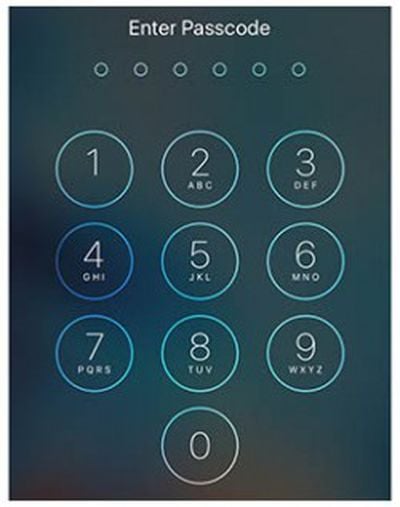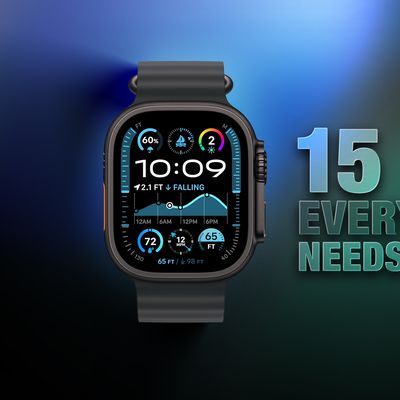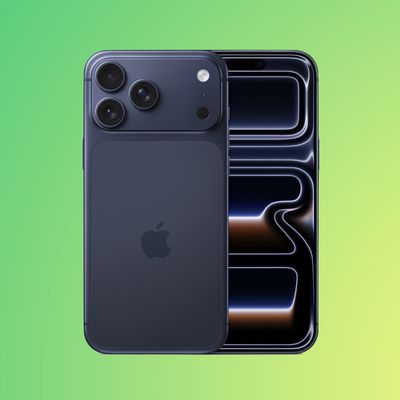 Ahead of Apple's court date with the Federal Bureau of Investigation tomorrow, Bloomberg has taken a dive into the company's history with the FBI to chart the buildup to the heated battle over security and encryption on smartphones. The timeline begins with Apple's introduction of iOS 8 in June of 2014, with Apple subsequently providing the FBI early access so the law enforcement agency "could study how the new system would change evidence-gathering techniques" ahead of the public release of iOS 8 in September of that year.
Ahead of Apple's court date with the Federal Bureau of Investigation tomorrow, Bloomberg has taken a dive into the company's history with the FBI to chart the buildup to the heated battle over security and encryption on smartphones. The timeline begins with Apple's introduction of iOS 8 in June of 2014, with Apple subsequently providing the FBI early access so the law enforcement agency "could study how the new system would change evidence-gathering techniques" ahead of the public release of iOS 8 in September of that year.
High-ranking officials at the FBI quickly learned that iOS 8 introduced a new form of encryption into the software that prevented any government agent, or Apple itself, from accessing data stored on the smartphone.
With that significant change in iOS 8, the relationship between Apple and the FBI began to destabilize, but the government didn't have enough backing to support legislation that would help it bypass the encrypted features of the new iOS. But with the San Bernardino terrorist attack last December, the FBI had a foothold to help it take the encryption issue public.
"The reason the relationship went south is the government was expecting some degree of accommodation on the part of the technology companies," said Timothy Edgar, the former director of privacy and civil liberties for the White House National Security Staff from 2009 to 2010. "They were expecting the companies to essentially back down and not go forward with new security measures that would make it impossible for you to access devices or communications. They were caught off guard by basically being told to get lost."
According to one of Bloomberg's sources, the government's first cause for concern with Apple's encryption actually began all the way back in 2010 when the company launched the encrypted video messaging service FaceTime, followed by iMessage in 2011. With the apps making it impossible for the FBI to even peek into criminal activity, the government was rapidly being made aware of "how much of a premium Apple put on privacy."
A few attempts at legislation that would allow the FBI to access encrypted data on smartphones with a court order were made sometime in 2013, but subsequently abandoned following the Edward Snowden controversy that year. According to Timothy Edgar, the former director of privacy and civil liberties for the White House, "there was a real split" in the administration regarding the encryption legislation.
When it became clear that the administration wouldn't support a new law that would help investigators gain access to iPhones and other devices, many FBI agents became frustrated and disappointed. Some recalled that the bureau was pilloried for not connecting the dots to prevent the Sept. 11, 2001, terrorist attacks, according to Leo Taddeo, the former special agent in charge of the New York FBI special operations and cyber division.
That sequence of events and the subsequent San Bernardino shooting ultimately led the government to take the issue public and seek a court order for Apple to unlock Syed Farook's iPhone, leading to Tim Cook's non-compliance letter, and the court date with the FBI on March 22. According to Edgar, now a senior fellow at Brown University, "Lawyers think privacy is you can't listen to my conversation without a warrant; technologists think privacy is you can't listen to my conversation, period. It's hard to reconcile those two points of view."
Apple has said that if the courts rule in favor of the FBI in the encryption case, it's ready to take the issue all the way to the Supreme Court. More recently, some Apple engineers have stated that if the company is forced to unlock the San Bernandino iPhone, they may decide to not comply with the ruling.
Check out Bloomberg's full story for more of the history between Apple and the FBI ahead of tomorrow's court date.
Note: Due to the political nature of the discussion regarding this topic, the discussion thread is located in our Politics, Religion, Social Issues forum. All forum members and site visitors are welcome to read and follow the thread, but posting is limited to forum members with at least 100 posts.





















Top Rated Comments
I'd also compare them to Reno 911, Super Troopers, etc. It's pathetic. They're just lazy and it's easy if we can be like Batman in that ridiculous scene in The Dark Knight and just hack everyone's phone and see everything happening everywhere at all times.
What drives me crazy is they keep pushing for all of this saying terrorism and so many people believe them. It has nothing to do with terrorism and everything to do with controlling we the people and asserting absolute rule over us. You wonder why they put complete idiots in control of nuclear weapons? It's like they want something to happen or go missing. That and I sometimes think they're starting to recruit the dumbest of the dumb that will just shut up and follow their heinous orders. I've always supported our troops and have family members who have served in the past and I respect their sacrifice but sometimes I wonder about the current state of things. It's one of the reasons that for years I never thought the government could truly control us because the soldiers wouldn't obey their orders. Now I'm starting to wonder, especially when you see so many police officers who have been blatantly abusing authority. There are still good officers and soldiers out there, but damn, we don't seem to be headed in the right direction with our morals and ethics.
The issue with these encryption backdoors is that you might have your phone/computer/whatever spied on remotely without your knowledge. They can do it for years without you knowing. At least when the government searches your physical "persons, houses, papers, and effects," they give you the courtesy of leaving everything a disheveled mess. You then know you've been searched, and you can call a lawyer, challenge the warrant and test its scope. If the warrant turns out to be invalid or that law enforcement exceeded the warrants scope, you can try to stop prosecution or you can get evidence obtained from that violation to be inadmissible in court. There are checks in that system that keep law enforcement (somewhat) honest.
In the digital realm, with the backdoors to encryption proposed by law enforcement, all those checks disappear. They can get a warrant and search your files, and you would have no reason to suspect that the warrant might be invalid or the scope of their snooping exceeds their proper authority until your privacy has been continuously violated for a long period of time.
Historically America has been referred to as the "leader of the free world." It's debatable as to whether that is still true, but it's still important to remember that what we decide today will have huge ramifications around the world. We're a leader in software internationally. This could weaken everything and empower nations who are against free speech. Do we really want to let the Chinese, Russians, North Koreans, etc all have inside knowledge to break into all of our devices? This is madness.
I've been saying this all along. What remaining countries will want to do business with us now? After the Snowden revelations, along with Wikileaks and other whistleblowing that has come to light, many countries are already extremely pissed at us. In America, we don't make much any more. But one of the few things we have left is that we develop and export software. This would ruin a huge industry. And as they say, even the Defense Department is worried about having security exploits in their own software. But then what—we make a special uncrackable version for just them? So that the people have no privacy but the government can conduct all the clandestine operations their hearts desire with no way to have any oversight or accountability for them? Some would argue that we're already at that point. This would only take us further to the brink by empowering a government that is out of control and weakening the privacy and freedom of normal people.
It's only a marketing pitch in the sense that it's something that people need and value: Privacy and security. It's like saying that something being edible is just a marketing pitch for food. You can't have one without the other. If it's not edible then it's not food. If it's not encrypted then it's not secure and private. End of story.
With quantum computing on the horizon, good luck cracking "spooky" entangled particle spin/momentum/position/polarization states between matched communication devices. That crap taps into some underlying fabric of the universe somewhere outside of spacetime (or at least I presume as it "breaks" the light speed barrier) and will not be hacked, lol. At least that's how I understand it—let me know if I'm way off base as I'm no quantum scientist. I just remember reading an article a year or two back about it being unhackable—maybe because the communications exist outside of reality? It was crazy and really cool.
/s
https://theintercept.com/2015/09/16/top-intel-lawyer-pushing-anti-encryption-legislation-says-terror-attack-help/
The fact that this is one of the shooters work phones, which the shooters didn't destroy (they destroyed their personal phones and computer) really dings the FBI need to do this PR for a precedent setting case, but the U.S. media has assisted by leaving that and other relevant detail(s) out of their coverage.
As I mentioned before, this push by the world governments to have access to all smartphones (to what is, in essence, the closest thing to a storage locker for the inside of our heads that exists) will not go away and will probably only get stronger. Add to that our secret FISA courts / orders, the occasional terrorist incidents (to give the total surveillance folks the public mood they need) and its not a good long term thing to expect to win against with a closed source model (that can could have back doors inserted without the public knowing whatever the cause).
Apple leadership needs to really reflect on this and come up with a strategy that can work against these forces long term - IMHO open sourcing (not free, but open source) their OS's, compiler, apps and BIOS / Firmware images (Lenovo ('https://www.techdirt.com/articles/20150812/11395231925/lenovo-busted-stealthily-installing-crapware-via-bios-fresh-windows-installs.shtml') has shown why) is the only way to fight this long term so they can be publicly audited (and discourage govts, the U.S. most importantly, from doing irresponsible / secret things by having the sunshine present). Massive work, but Apple sales would then go through the roof.